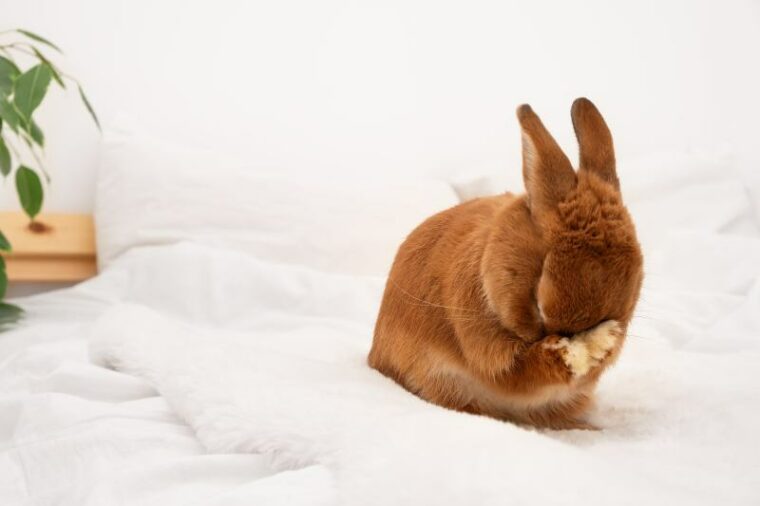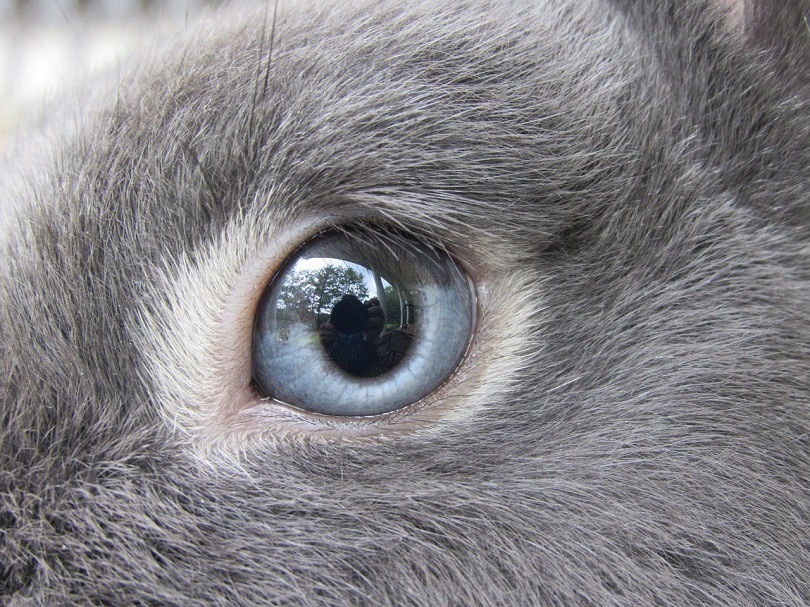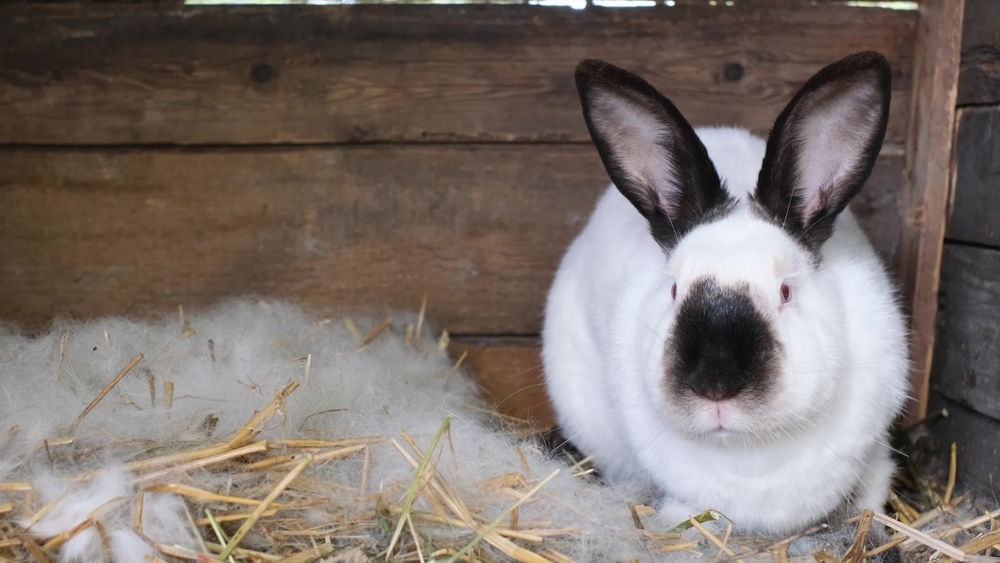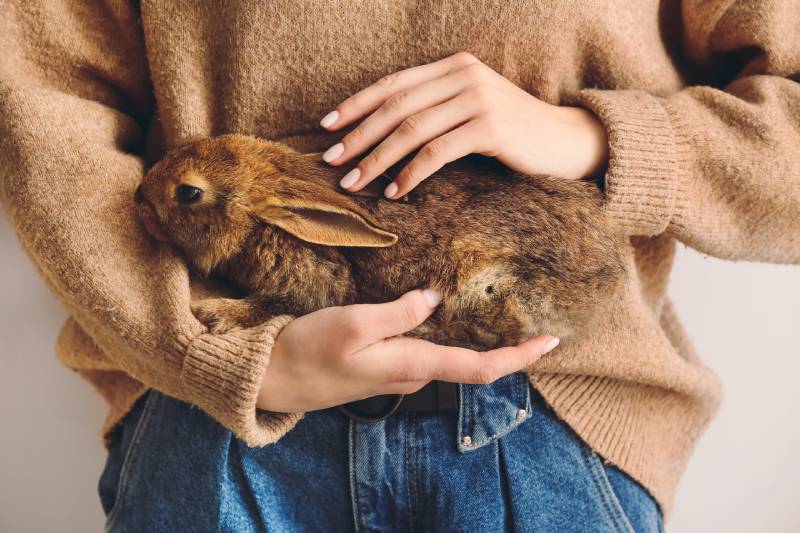
The folklore of rabbits crying tears is one that has been around for centuries, and there are many theories as to why this might be. The truth is that even though rabbits naturally produce tears, they don’t cry tears as an emotional response. Therefore, if you see rabbit tears, there’s a good chance your pet is experiencing irritation, infection, a foreign body, inflammation, or injury. Let’s take a deeper look.
What Are Rabbit Tears?
Rabbits’ tears are vital for the normal functioning of the eye, playing an important role in vision, lubrication, and protection of the eye. Tearing, also known as epiphora, can be due to the over-production of tears or to a lack of drainage. In rabbits, tearing is mostly caused by inadequate tear drainage due to dental disease, but eye conditions that range from mild to severe can also cause tearing. Eye problems in rabbits can manifest as watery eyes and occasionally a creamy discharge. It is important to monitor your pet closely and contact a veterinarian immediately if you suspect any eye problems. These can be painful and can even result in blindness.
Treatment for tearing will depend on the underlying cause. If the overflow of tears is a result of an illness or injury within the eye, your veterinarian may prescribe medication or recommend surgery to repair a wound. If tearing is caused by blocked tear ducts, flushing or even surgery may be necessary, depending on the reason for the blockage (for example, a foreign body or dental disease). Additionally, your vet can provide advice on how to look after your rabbit, ensuring that they get adequate nutrition, exercise, and a healthy environment. Your vet can also show you how to inspect your rabbit’s eyes, face, and body to detect health problems.

What Does Science Say About Rabbit Emotions and Tears?
Science has found that rabbits can experience multiple emotions, including joy, fear, stress, and worry. While they don’t cry tears as humans do, they may express their discomfort or distress through other means such as vocalizations, ear and body position, or the way they move. Studies have also shown that rabbits are highly social animals, forming close bonds with their owners and other rabbits in their environment. However, the production of emotional tears appears to be unique to humans. That means if you see rabbit tears or watery eyes, they’re not crying, but rather, experiencing an eye condition.
Keeping Your Rabbit’s Eyes Healthy When You See Tears
Seeing tears in your rabbit’s eyes can be heartbreaking, but it is important to stay calm and observe your rabbit carefully. If you think the tears are due to an illness or injury, contact a veterinarian immediately for diagnosis and treatment. Additionally, take steps to ensure that your bunny has a safe environment free from stressors. Finally, provide plenty of love and attention so that your pet always feels secure and loved.
Understanding Rabbit Language and Body Language
Rabbits communicate with each other through a variety of methods. From vocalizations to body language, understanding what your rabbit is trying to tell you requires paying attention to both verbal and, most commonly, nonverbal cues. Some signs that a rabbit might be feeling stressed or uncomfortable include cowering, head held flat to the ground, ears wide apart and flattened, and dilated pupils. An unhappy rabbit will try to run away, hide in corners or behind furniture, flick their back feet, or grind their teeth loudly.

Different Emotions Rabbits Express by Their Behavior and Actions
Rabbits can express a variety of emotions by their behavior and actions. From joy to fear, anger to sadness, understanding what your rabbit is trying to tell you requires paying attention to both verbal and nonverbal cues.
Signs Your Rabbit Is Happy or Content
In addition to these behaviors, there are also a few physical signs that can indicate when your rabbit is happy or content. For example, rabbits may lie down, with a relaxed body posture and legs tucked under their body or stretched out behind their body with their front paws pointing forward. Additionally, a rabbit in a good mood will often lick its owner as an affectionate gesture.
A happy rabbit may exhibit certain behaviors to show their contentment. These signs can include hopping in circles, running in zig zags, purring, and making soft chirping noises. Additionally, rabbits will often groom themselves and stretch out comfortably when they are feeling relaxed.
Signs Your Rabbit Is Unhappy or Stressed
On the other hand, there are certain behaviors that can indicate when a rabbit is feeling stressed or unhappy. For example, rabbits often cower in the corner of their cage when they are scared and tense. They may also thump their feet repetitively as a sign of distress. Additionally, rabbits may become territorial and growl if they feel threatened or uncomfortable.

Signs Your Rabbit Is Lonely or Bored
In some cases, rabbits may experience boredom due to a lack of social interaction or stimulation. Signs of loneliness and boredom in rabbits include lethargy, loss of appetite, excessive grooming, and hiding away from humans and other animals.
Signs Your Rabbit Loves You
Lastly, there are a few signs that can indicate when your rabbit loves you. These include hopping up to you for cuddles, licking your hand or face as a sign of affection, and perking up when they see you.
Ways to Comfort Your Rabbit in Times of Stress
There are several ways you can comfort your rabbit in times of stress. One way is to provide them with a safe hiding place where they can retreat when they need a break from their environment. Additionally, offering treats and providing gentle physical contact, such as petting or snuggling, can help to reduce the rabbit’s fear and anxiety. Additionally, spending quality time with your bunny by engaging in activities such as playing with toys, providing enrichment, or having bonding time can all help to reduce stress levels.

Creating a Safe Environment for Your Pet Rabbit
To keep your pet rabbit safe and happy, it’s important to create an environment that is free from potential dangers, such as loud noises or sudden movements. Additionally, make sure that their cage is properly secured and has adequate space for them to move around comfortably.
To ensure that your rabbit is comfortable in its enclosure, make sure it has plenty of space to move around and explore. Additionally, provide your rabbit with hiding places so they can retreat if necessary. Also, make sure their bedding is clean and soft, and give them access to plenty of toys or other items that will keep them entertained. Ensure your rabbit gets enough exercise and time to roam free. Finally, ensure that they have plenty of fresh food and water available at all times.
What to Do If You Think Your Rabbit Is Unwell
If you think your rabbit is unwell, it’s important to visit a veterinarian. A veterinarian can assess the rabbit’s health, provide medications or therapies as needed, offer advice on environmental enrichment, and even refer you to a specialist who can help with more complex issues.
Conclusion
Despite the myth, rabbits do not cry tears when they are in pain or distress. Understanding rabbit behavior and being observant is essential for detecting signs of discomfort so you can respond appropriately with care and empathy. Creating a safe environment as well as providing plenty of love and enrichment opportunities are key to keeping your rabbit happy and healthy. With the right knowledge, understanding, and care, you can ensure that your pet rabbit has a long, happy life free from stress.
Featured Image Credit: Olga Smolina SL, Shutterstock










